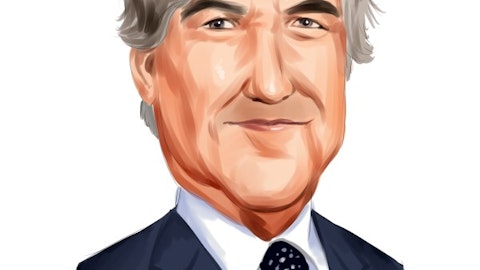Bruce Kovner established his investment firm, Caxton Associates, in 1983. The firm currently has $10 billion in assets under management. Its investment approach relies on global macro hedge fund strategies. In fact, Caxton Associates was one of the first hedge-fund managers to base its investment strategy on macroeconomic trends for a broad range of investment vehicles.
The firm’s flagship hedge fund, Caxton Global Investment Fund, has returned on average 21% per year since inception. This outperforms the S&P 500 index return of 11% on average over the same period. Last year, the Caxton Global Investment Fund returned 0.7% net of fees.
In late 2011, Kovner stepped down from the helm of his investment management firm. He was the third longest-serving manager of a macro hedge fund after billionaires Stanley Druckenmiller and George Soros. With net worth of $4.5 billion, Kovner is currently ranked the world’s 232nd richest person.
Currently, Kovner’s former hedge fund, Caxton Associates, holds large stakes in several financial services firms. Here is a glance at four such financial stocks paying dividends:


Wells Fargo & Company (NYSE:WFC) is the second largest position in the Caxton Associates’ portfolio. The stake is currently valued at $98.5 million. Wells Fargo & Company is the 4th largest U.S. bank by asset size. It has a market cap of $ billion. The bank’s EPS grew at a meager 2.7% average annual rate over the past five years. The rate of EPS growth is expected to more than triple over the next five years. The bank is attractive on valuation, as it features a comparably high ROE of 12.1%, earnings yield of 11%, P/E well below the bank’s historical metrics, and price-to-book of 1.2 (historically very low, but still above the industry’s ratio). Despite low interest rates’ compressing margins, Wells Fargo has seen high refinancing volumes due to record low mortgage rates. Wells Fargo pays a dividend yield of 2.7% and has a dividend payout ratio of 30%. Competitors JPMorgan Chase & Co. (NYSE:JPM), Bank of America Corporation (NYSE:BAC), and Citigroup (NYSE:C) pay dividend yields of 3.5%, 0.6%, and 0.2%, respectively. The stock is currently changing hands at $33.81 a share, up 24% over the past 12 months, and close to its 52-week high. The Oracle of Omaha, Warren Buffett, holds a fifth of his portfolio value in this stock (see Warren Buffett’s top picks).
PNC Financial Services Group (NYSE:PNC) represents another dividend-paying financial stock in Caxton Associates’ portfolio. This stake in the 11th largest U.S. bank is currently valued at $58 million. PNC Financial, a diversified regional bank with market cap of $32 billion, is expected to boost its EPS by 6.3% per year, on average, for the next five years. As it is the case with all U.S. banks, margin compression due to falling interest rates represents a threat to revenue and earnings growth. The bank reported strong net income growth and margins in the previous quarter, driven by the RBC Bank (USA) acquisition. Earnings were adversely affected by a large provision for residential mortgage loan repurchase obligations. PNC Financial Services Group has solid cash flow from operations, expanding profit margins, and attractive valuation. The bank’s price-to-book ratio is on par with that for the industry. Its ROE is 8.9%, above the average for its respective industry. The bank pays a dividend yield of 2.7% on a low payout ratio of 33%. Its competitors, U.S. Bancorp (NYSE:USB), Comerica Inc. (CMA), BB&T Corporation (NYSE:BBT) pay yields of 2.3%, 2.0%, and 2.5%, respectively. The stock is trading at $59.14 a share, up 4% over the past year. The stock is widely held among billionaire fund managers, including Ken Fisher, Ken Griffin, and Cliff Asness.
Synovus Financial Corporation (NYSE:SNV) is also a large financial holding in the Caxton Associates portfolio. It is currently valued at $44 million. The firm is a small cap, regional financial services and bank holding company. The bank holding company is currently weaker than most mid-tier regional banks. It is highly susceptible to adverse changes in economic conditions because it has a real estate-centric loan portfolio. While its credit quality has been improving gradually, the bank still has a high percentage of non-performing assets. Still, reductions in credit losses and cost cutting have helped the bank return to profitability. The bank has a price-to-book ratio of 0.8, slightly below that of its peers on average. In terms of the forward P/E, the bank is priced well above its respective industry. Synovus Financial Corporation pays a dividend yield of 2.1% on a payout ratio of 29% of last year’s free cash flow. Its peers BB&T Corporation (NYSE:BBT), SunTrust Banks, Inc. (NYSE:STI), and Regions Financial Corp. (NYSE:RF) yield 2.5%, 0.9%, and 0.6%, respectively. The stock is changing hands at $1.91 a share, down 7.3% from last year. Among fund managers, the company is popular with billionaire Glenn Dubin (Highbridge Capital Management—see its top picks).
BB&T Corporation (NYSE:BBT) is also one of Caxton Associates’ financial holdings. This stake is currently valued at $27 million. BB&T Corporation is the 17th largest U.S. financial institution by asset size. It has a market cap of $22 billion. The bank has just posted earnings that beat analysts’ expectations. The bank saw record net income, driven by strong growth in mortgage refinancing and home purchase loans as well as by insurance business record revenues and earnings. Credit quality has improved significantly. The bank has a price-to-book ratio of 1.2, above the industry’s average and its own average ratio over the past five years. Its ROE of 8.7% is above that of its peers on average. The bank’s forward P/E is slightly above that of the industry but below the bank’s historical averages. BB&T Corporation pays a dividend yield of 2.7% on a payout ratio of 33%. Billionaires Ken Fisher and Ray Dalio are fans of the stock.





